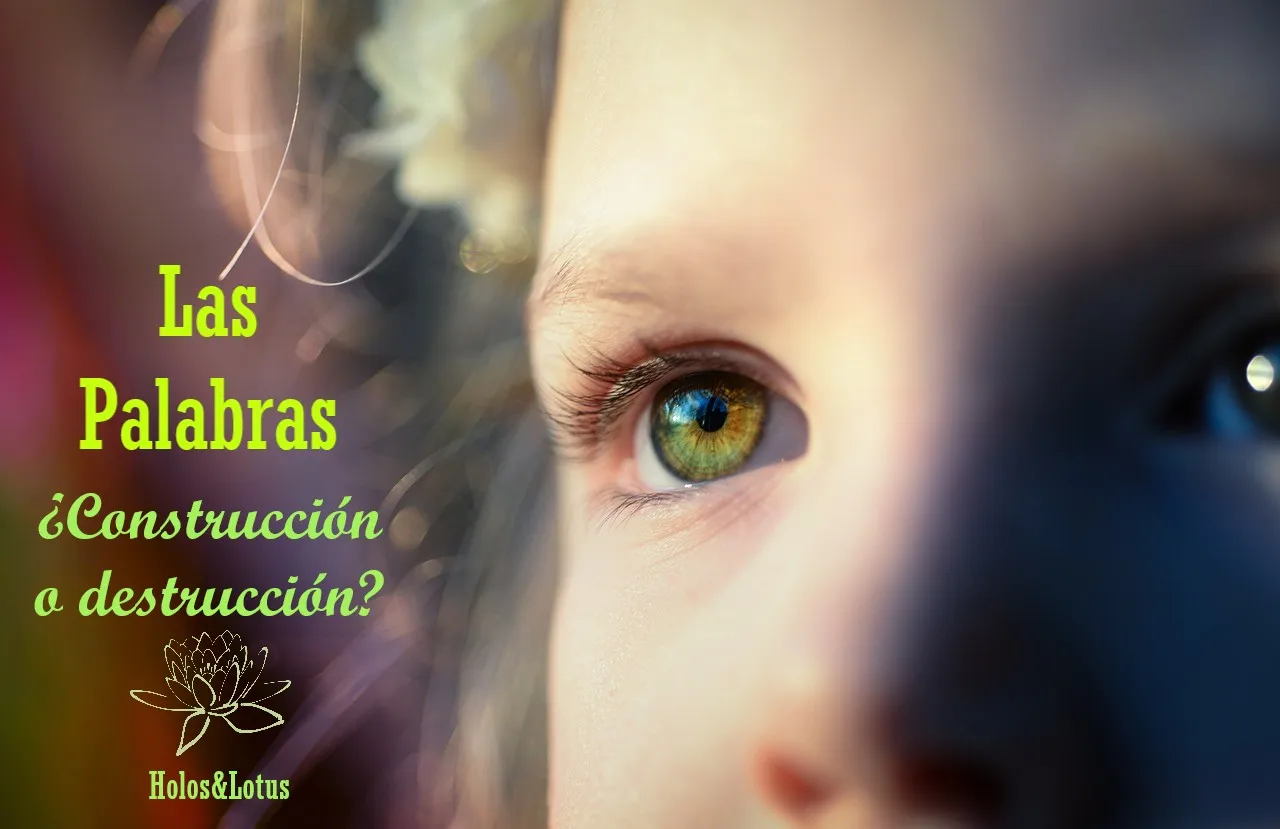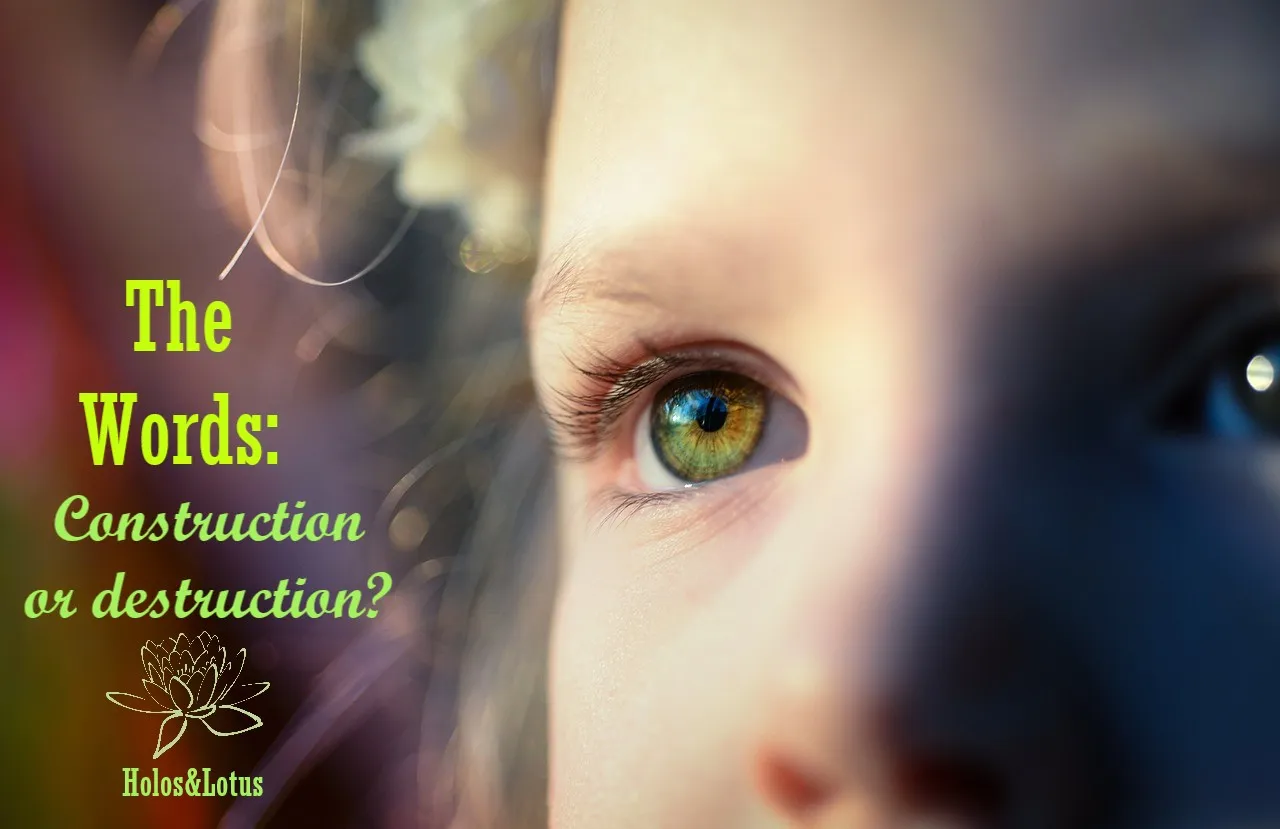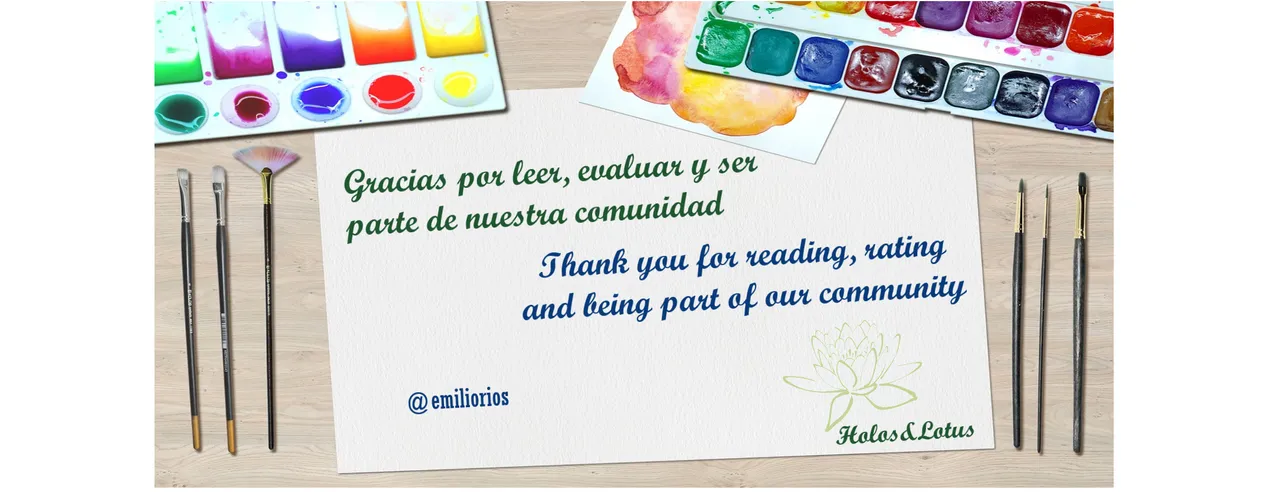

Cada día, muchas publicaciones en @holos-lotus nos enseñan cómo crecer y ser mejores versiones de nosotros mismos.
Y como dice @palomap3: "...Leemos una publicación y sentimos que el autor parece estar hablándonos de nuestra propia vida."
Esta iniciativa: Palabras que inspiran, nos permite hacer una revisión, cada determinado tiempo, de las excelentes publicaciones que hay en nuestra comunidad.
En estos últimos días, he estado siguiendo las publicaciones sobre la palabra; sobre el efecto en la formación del individuo, en los niños; en lo difícil que es manejar los términos en forma correcta; en la importancia que tiene el lenguaje; lo que construye y lo que destruye la palabra.
Aquí, la comunidad nos está dando reflexiones impresionantes sobre las palabras y su manejo, sobre todo, el manejo inteligente-emocional; así que, repasaremos tres publicaciones que me parecieron de mucho peso para nuestro crecimiento.


Ser impecable con las palabras
Qué mal hemos manejado los términos: Pecar e impecable.
Cuando hablamos de pecar, que es un término que, básicamente, encontramos relacionado con las religiones; estamos hablando de no dar en el blanco, de no hacer lo correcto.
Cuando las escrituras bíblicas se tradujeron del griego antiguo, el término errar se tradujo como pecar; pero el ser humano maneja ser impecable como ser perfecto, lo cual no es.
Por eso, Miguel Ruiz habla, en la filosofía tolteca, en sus Cuatro Acuerdos para mejorar nuestras existencias, de ser impecables con tus palabras; es decir, de no pecar con ellas; de cometer, lo menos posible, errores.
Se advierte, que no transmitas veneno personal, que se recree el mundo con palabras positivas y de crecimiento; y nos habla, en forma de mandato, de estudiar y trabajarse uno mismo.
Entendiendo que, todo comienza desde dentro hacia afuera; que es nuestra familia la depositaria de nuestras transformaciones y acciones personales, y que, de allí, va al entorno.
Todos podemos transformar el poder que ejercen nuestras palabras, de negativo a positivo, en un mundo donde estamos acostumbrados a mal utilizarlas.

El peso de las palabras
Cuando un ser humano se estudia, se evalúa y trabaja en pro de su crecimiento; va a ser capaz de captar cuando el lenguaje está siendo mal utilizado, cuando no se le da la dimensión correcta a ciertas palabras y cuándo se hace referencia al daño que le podemos ocasionar al otro.
En el ahora, malinterpretamos muchos términos; y una de las publicaciones que me parece ilustrativa y aleccionadora, es la de @bonzopoe: El peso de las palabras.
Verbos como odiar, amar, necesitar, usados en forma exagerada y a veces minimizando significativamente, como dice el autor, sus significados.
Utilizamos con ligereza palabras tan importantes y de gran peso: Te amo, odiamos a fulano, él es un misógino, es un homofóbico; adoro esta situación; y otras, que son frases que, sin saber realmente la dimensión, las estamos utilizando con mucha -demasiada- frecuencia y, en contextos sociales y morales, delicados...
Se nos recuerda que nos apoyamos con emoticones; caras felices, corazones que cobran vida; porque estamos dejando testimonio escrito de nuestras emociones y de la mala utilización del significado de las palabras.
@bonzopoe nos recuerda que existe un eco que debemos cuidar; y que debemos ser parte lo menos posible del desatino o mal uso de las palabras.
Igual que Miguel Ruiz, nuestro amigo nos habla de desatinar o no pecar en el uso de las palabras, y evaluar el significado de las frases y verbos que utilizamos.

El doble filo de una palabra
Por otro lado, la incondicional amiga @parauri ofrece una iniciativa a la que muchos han respondido, y que tiene que ver con el uso del lenguaje y las expresiones en el trato con nuestros hijos: Lenguaje con doble filo.
Ella nos recuerda que hay que hablar con un lenguaje inclusivo, donde todos sean valorados y evaluados como personas o seres con condiciones reales que deben ser tratadas de la forma más correcta y normal posible.
Nos expone la manera adecuada y directa de dirigirnos hacia los niños para que aprendan a trabajar sobre el lenguaje, sin amenazas y sin descalificaciones; de lo delicado que es abordar, mediante expresiones, la apariencia de alguien.
Advierte que, el lenguaje inclusivo malentendido puede ser peligroso.
Muchas veces, por quedar bien, expresamos situaciones que no sentimos; y eso se capta o se conoce.
Pero también, los seres humanos con condiciones pueden verse llenos de expresiones y cuidados que pueden quitarle la capacidad de ser responsables.
El lenguaje debe ser, más que inclusivo o exclusivo, una caricia o un arma de formación psicoemocional y psicológica.

Lo que nos lleva a: Formar al hombre
Por último, @charjaim habla en El papel de las palabras y la formación del individuo; de lo que significa el acto de educar a los niños, jóvenes y adultos que están inmersos en una situación como la moderna.
Existen redes sociales, foros, encuestas generadas en mensajerías; donde todos tienen la libertad de hablar hasta en forma anónima; y eso lo vemos a diario.
En la práctica, una simple noticia genera miles de discusiones, de conversaciones, de expresiones, opiniones y críticas, que uno puede observar que son tan mal cuidadas en muchos aspectos de tipo ético.
El ejemplo que @charjaim nos expone, de una niña que se definía bruta o ignorante, por habérselo creído de expresiones de los otros; nos recuerda que la formación con las palabras y expresiones correctas, es importante para el autoconcepto y la autoestima.
Se conoce que no es fácil estar atentos a cada una de las palabras y frases que expresamos, pero sí, a la capacidad de reflexionar en cuanto a las situaciones que involucren la dignidad propia y la del otro, porque esto, inconscientemente, va modulando nuestro lenguaje, nos hace cuidadosos de lo que expresamos y hasta empáticos ante las críticas.

Ese mágico don que debemos cuidar
Si hay algo que me ha hecho reflexionar, aparte de estas publicaciones; porque también está la publicación de @mercmarg inspirada en lenguaje con doble filo, donde se nos recuerda que el lenguaje es energía y que es visualizado a través de buenas o malas vibraciones; ha sido una reflexión que conseguí fuera de la plataforma de #hive
María Calvo del Brío (2020) en comunicacionenforma.com nos dice sobre el impacto que tienen tus palabras; que dan forma a la visión del mundo.
Nos advierte que las palabras tienen impacto en nuestra productividad personal; y recordemos lo que significa tener una autoestima o un autoconcepto por el suelo para nuestros emprendimientos.
Igualmente, influyen en nuestro estado emocional; pero también, en nuestro enfoque: Si nos autocatalogamos en forma equivocada fracasamos, inevitablemente.
Calvo del Brío nos refiere, que es nuestro léxico el mapa del mundo que le heredamos a nuestros hijos y a los niños a los que educamos; que es un testamento de valores y de buenas o malas percepciones de la vida.
Que es, a través de la construcción del significado de las cosas y eventos, como construimos nuestras acciones.
Y son las acciones las que pueden construir o destruir el mundo.
Para terminar, hay que acentuar el impacto que tienen las palabras sobre los demás, pues, nos conectan o nos desconectan.
Por lo tanto, nos corresponde comenzar a cambiar en este aspecto y educarnos.

- Esta es mi entrada al llamado de iniciativa: Palabras que inspiran # 21 desde la Dapp Ecency @ecency de #hive
- Invito, calurosamente a @lduranjwp a participar y conocer mejor nuestra comunidad; a @equipodelta quien se sentirá como pez en el agua con esta iniciativa y a @leidimarc a quien estoy muy complacido de seguir por este gran ecosistema.


Be careful with words! Destruction or construction? -Reflections in: Words that Inspire-


Every day, many posts on @holos-lotus teach us how to grow and become better versions of ourselves.
And as @palomap3 says: "...We read a post and feel like the author seems to be talking to us about our own life."
This initiative: Words that Inspire, allows us to do a review, every so often, of the excellent publications out there in our community.
In these last few days, I have been following the publications on the word; on the effect on the formation of the individual, on children; on how difficult it is to handle terms correctly; on the importance of language; on what the word builds and what it destroys.
Here, the community is giving us impressive reflections on words and their management, above all, the intelligent-emotional management; so, we will review three publications that seemed to me of much weight for our growth.


Being impeccable with words
How badly we have mishandled the terms: Sin and impeccable.
When we speak of sinning, which is a term that, basically, we find related to religions; we are speaking of missing the mark, of not doing the right thing.
When the biblical scriptures were translated from the ancient Greek, the term err was translated as sin; but the human being manages to be impeccable as being perfect, which he is not.
For that reason, Miguel Ruiz speaks, in the Toltec philosophy, in his Four Agreements to improve our existences, of being impeccable with your words; that is to say, of not sinning with them; of committing, as little as possible, errors.
It warns not to transmit personal poison, to recreate the world with positive words and words of growth; and it speaks to us, in the form of a mandate, to study and work on oneself.
Understanding that everything starts from the inside out; that our family is the repository of our personal transformations and actions, and from there, it goes to the environment.
We can all transform the power of our words, from negative to positive, in a world where we are accustomed to misuse them.

The weight of words
When a human being studies himself, evaluates himself and works towards his growth, he will be able to understand when language is being misused, when certain words are not given the right dimension and when we refer to the harm we can cause to others.
In the present, we misunderstand many terms; and one of the publications that I find illustrative and instructive is that of @bonzopoe: The weight of words.
Verbs such as hate, love, need, used in an exaggerated way and sometimes significantly minimizing, as the author says, their meanings.
We lightly use such important and weighty words: I love you, we hate so-and-so, he is a misogynist, he is a homophobe; I love this situation; and others, which are phrases that, without really knowing the dimension, we are using them very -too- often and, in social and moral contexts, delicate....
We are reminded that we support ourselves with emoticons; happy faces, hearts that come to life; because we are leaving written testimony of our emotions and of the misuse of the meaning of words.
@bonzopoe reminds us that there is an echo that we must take care of; and that we must be part as little as possible of the inanity or misuse of words.
Just like Miguel Ruiz, our friend talks to us about misusing or not misusing words, and evaluating the meaning of the phrases and verbs we use.

The double edge of a word
On the other hand, the unconditional friend @parauri offers an initiative to which many have responded, and that has to do with the use of language and expressions in dealing with our children: Double-edged language.
She reminds us that we must speak with inclusive language, where everyone is valued and evaluated as people or beings with real conditions that should be treated in the most correct and normal way possible.
@parauri shows us the appropriate and direct way to address children, so that they learn to work on language, without threats and disqualifications; how delicate it is to address, through expressions, someone's appearance.
She warns that misunderstood inclusive language can be dangerous.
Many times, in order to look good, we express situations that we do not feel; and this is perceived or known.
But also, human beings with conditions can be full of expressions and cares that can take away their ability to be responsible.
Language should be, more than inclusive or exclusive, a caress or a weapon of psycho-emotional and psychological formation.

This leads us to: Forming man
Finally, @charjaim talks in The role of words and the formation of the individual; of what the act of educating children, youth and adults who are immersed in a situation like the modern one means.
There are social networks, forums, polls generated in messengers; where everyone has the freedom to speak even anonymously; and we see this on a daily basis.
In practice, a simple news item generates thousands of discussions, conversations, expressions, opinions and criticisms, which one can observe are so poorly cared for in many ethical aspects.
The example that @charjaim gives us, of a girl who defined herself as brute or ignorant, for having believed the expressions of others; reminds us that training with the right words and expressions, is important for self-concept and self-esteem.
It is known that it is not easy to be attentive to each of the words and phrases we express, but it is easy to be able to reflect on situations that involve our own dignity and that of others, because this unconsciously modulates our language, makes us careful about what we express and even empathetic in the face of criticism.

That magical gift that we must take care of
If there is something that has made me reflect, apart from these publications; because there is also the publication of @mercmarg inspired by double-edged language, where we are reminded that language is energy and that it is visualized through good or bad vibrations; it has been a reflection that I got outside the #hive platform.
María Calvo del Brío (2020) in comunicacionenforma.com tells us about the impact that your words have; that they shape the vision of the world.
He warns us that words have an impact on our personal productivity; and let's remember what having a low self-esteem or self-concept means for our undertakings.
Likewise, they influence our emotional state; but also, our approach: If we self-talk ourselves in the wrong way, we inevitably fail.
Calvo del Brío tells us that our lexicon is the map of the world that we inherit to our children and to the children we educate; that it is a testament of values and of good or bad perceptions of life.
That it is, through the construction of the meaning of things and events, that we construct our actions.
And it is actions that can build or destroy the world.
Finally, we must emphasize the impact that words have on others, for they either connect or disconnect us.
Therefore, it behooves us to begin to change in this regard and educate ourselves.

- This is my entry to the call for initiative: Words that inspire #21 from the Dapp Ecency @ecency from #hive
- I warmly invite @lduranjwp to participate and get to know our community better; @equipodelta who will feel like a fish in water with this initiative and @leidimarc who I am very pleased to follow for this great ecosystem.

Emilio Ríos – Venezuela
@emiliorios


- Logo de Holos&Lotus de la imagen principal, tomado de:
Holos&Lotus logo of the lead image, taken from:
PIxabay- Clker-Free-Vector-Images
- Barras separadoras y logo de English editadas en Paint, de:
Separator bars and English logo edited in Paint, from:
Pixabay-Miniformat65
- Cintillo personalizado de @emiliorios con el logo de #holos-lotus, realizado en Paint con la imagen de:
Customized @emiliorios sticker with the #holos-lotus logo, made in Paint with the image of:
Pixabay- Clker-Free-Vector-Images
- Imagen de agradecimiento editada en Paint, utilizando respetuosamente el logo de la comunidad:
Thank you image edited in Paint, respectfully using the community's logo:
Pixabay-1681551
- Logo de Twitter
Twitter logo:
Pixabay-PixLoger
- Si lo deseas, puedes seguirnos en:
If you wish, you can follow us at:





